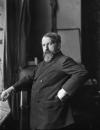Biography
Dr. Arthur Schnitzler (15 May 1862, Leopoldstadt, Vienna - 21 October 1931, Vienna) was an Austrian author and dramatist.
Private life
Arthur Schnitzler, son of a prominent Hungarian-Jewish laryngologist Johann Schnitzler (1835-1893) and Luise Markbreiter (1838-1911) a daughter of the Viennese doctor Philipp Markbreiter, was born in Praterstraße 16, Leopoldstadt, Vienna, in the Austro-Hungarian Empire. He began studying medicine at the University of Vienna in 1879 and received his doctorate of medicine in 1885 and worked at the Vienna's General Hospital (German: Allgemeines Krankenhaus der Stadt Wien, AKH), but ultimately abandoned medicine in favour of writing. On 26 August 1903, Schnitzler married 21-year old aspiring actress and singer Olga Gussmann (1882-1970) who came from a Jewish middle class. They had a son together, Heinrich (1902-1982), who had been born on 9 August 1902. In 1909 they had a daughter, Lili (1909-1928), who committed suicide. The Schnitzlers separated in 1921. Schnitzler died on 21 October 1931, in Vienna, of a brain hemorrhage. Heinrich went to the United States in 1938, following the Anschluss, and did not return to Austria until 1959. Heinrich is the father of the Austrian musician and ecologist Michael Schnitzler, born in 1944 in Berkeley, California. He moved to Vienna with his parents in 1959.
Literary works
His works were often controversial, both for their frank description of sexuality (Sigmund Freud, in a letter to Schnitzler, confessed "I have gained the impression that you have learned through intuition ? though actually as a result of sensitive introspection ? everything that I have had to unearth by laborious work on other persons") and for their strong stand against anti-Semitism, represented by works such as his play Professor Bernhardi and the novel Der Weg ins Freie. However, though Schnitzler was himself Jewish, Professor Bernhardi and Fräulein Else are among the few clearly identified Jewish protagonists in his work. Schnitzler was branded as a pornographer after the release of his play Reigen, in which ten pairs of characters are shown before and after the sexual act, leading and ending with a prostitute. The furore after this play was couched in the strongest anti-semitic terms. 'Reigen was made into a French language film in 1950 by the German-born director Max Ophüls as La Ronde. The film achieved considerable success in the English-speaking world, with the result that Schnitzler's play is better known there under Ophüls' French title. In the novella Fräulein Else (1924), Schnitzler may be rebutting a contentious critique of the Jewish character by Otto Weininger (1903) by positioning the sexuality of the young female Jewish protagonist. The story, a first-person stream of consciousness narrative by a young aristocratic woman, reveals a moral dilemma that ends in tragedy. In response to an interviewer who asked Schnitzler what he thought about the critical view that his works all seemed to treat the same subjects, he replied, "I write of love and death. What other subjects are there?" Despite his seriousness of purpose, Schnitzler frequently approaches the bedroom farce in his plays (and had an affair with one of his actresses, Adele Sandrock). Professor Bernhardi, a play about a Jewish doctor who turns away a Catholic priest in order to spare a patient the realization that she is on the point of death, is his only major dramatic work without a sexual theme. A member of the avant-garde group Young Vienna (Jung Wien), Schnitzler toyed with formal as well as social conventions.
With his 1900 short story Lieutenant Gustl, he was the first to write German fiction in stream-of-consciousness narration. The story is an unflattering portrait of its protagonist and of the army's obsessive code of formal honour. It caused Schnitzler to be stripped of his commission as a reserve officer in the medical corps ? something that should be seen against the rising tide of anti-semitism of the time.He specialized in shorter works like novellas and one-act plays. And in his short stories like "The Green Tie" ("Die grüne Krawatte") he showed himself to be one of the early masters of microfiction. However he also wrote two full-length novels: Der Weg ins Freie about a talented but not very motivated young composer, a brilliant description of a segment of pre-World War I Viennese society; and the artistically less satisfactory Therese. In addition to his plays and fiction, Schnitzler meticulously kept a diary from the age of 17 until two days before his death. The manuscript, which runs to almost 8,000 pages, is most notable for Schnitzler's casual descriptions of sexual conquests ? he was often in relationships with several women at once, and for a period of some years he kept a record of every orgasm. Collections of Schnitzler's letters have also been published. Schnitzler's works were called "Jewish filth" by Adolf Hitler and were banned by the Nazis in Austria and Germany. In 1933, when Joseph Goebbels organized book burnings in Berlin and other cities, Schnitzler's works were thrown into flames along with those of other Jews, including Einstein, Marx, Kafka, Freud and Stefan Zweig. ..






